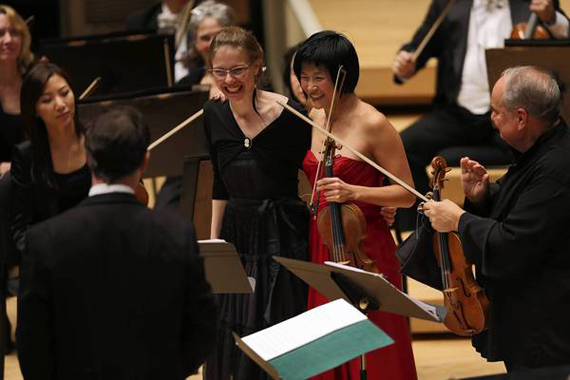Chicago Tribune
By John von Rhein
December 14, 2012
original
link
CSO goes Bach to the future with luminous new work at its center

( Scott Strazzante, Chicago Tribune / December 13, 2012 )
Resident composer Anna Clyne stands with violinist Jennifer Koh as Harry Bicket (left) and Jaime Laredo (right) applaud at Symphony Center in Chicago on Thursday.
The less-is-more principle doesn't always bring consistently high results when it's applied at the Chicago Symphony Orchestra, but it provides a refreshing change of musical perspective for this weekend's subscription concerts at Symphony Center.
With the orchestra players forming chamber ensembles of various sizes, the British Baroque specialist Harry Bicket is leading a program that combines three J.S. Bach concertos with concertos from the 20th and 21st centuries that use Bach and Baroque procedures as models. The local premiere of Anna Clyne's "Prince of Clouds" (2012) on Thursday night introduced the audience to a different side of the CSO's composer in residence, and a most appealing one it is.
Clyne wrote the double violin concerto on commission from the CSO and several other musical organizations as a gift to Thursday's soloists – her longtime friend, the Chicago-born violinist Jennifer Koh, and Jaime Laredo, Koh's former teacher at the Curtis Institute of Music in Philadelphia. It's the first concerto she's ever composed, and it's a winner.
A string orchestra enfolds the violinists in limpid textures that set off a continuous series of dialogues between the soloists. Those dialogues alternate lyrical materials ("soaring and singing" is one of the designations) with sections made up of terse, choppy, staccato figures. The soloists' intertwining lines draw on different types of string writing, from a vibrato-less, consort-of-viols kind of texture to aggressive, agitated, more rhythmically driven sounds, punctuated at one point by snapped pizzicatos in the supporting strings. The tonal polyphony at times echoes Clyne's British forebears Benjamin Britten and Michael Tippett.
What struck me particularly about the 15-minute piece was the ethereal quality of Clyne's harmonies and the way her melodies took radiant flight over those harmonies. A new accessibility and simplicity seem to have entered the Chicago-based composer's vocabulary. "Prince of Clouds" (the title is left unexplained) struck me as more successful than Clyne's previous CSO piece, "Night Ferry," which Riccardo Muti premiered here in February; it shoots for less and achieves more. This is music one can listen to again and again and find new things to appreciate each time.
"Prince of Clouds" no doubt will be taken up by other star violinists, but none are likely to play it with greater authority than Koh and Laredo did on Thursday night. Trading and meshing phrases like champion relay runners, they made a simpatico team in tandem with Bicket and the CSO strings. The audience greeted the new work warmly, and both soloists, along with Bicket, drew grateful hugs from the composer.
Koh and Laredo returned later in the program to perform the most famous double violin work, Bach's D minor Concerto (BWV 1043). Their musical conversation proved especially rewarding in the songful slow movement, despite (or maybe because of) the soloists' different application of vibrato and portamento.
The CSO's mini-Bach fest also included the first subscription performance of the composer's A major Concerto for oboe d'amore and strings (BWV 1055). The "oboe of love" is the mellow, mezzo-soprano voice of the oboe family. Nobody spins seamless legato lines on the instrument more beautifully than Scott Hostetler, the CSO's splendid principal English horn. He received crisp, airy support from Bicket and his CSO colleagues.
Too bad the contributions of the British guest conductor, who officiated at the harpsichord for all three of the evening's Bach works, including the "Brandenburg" Concerto No. 6, were so discreet as to be barely audible. The latter concerto, which brought to the fore the CSO's first-stand violists, Charles Pikler and Li-Kuo Chang, was the weak link of the program, hampered by ill-matched intonation.
No more appropriate bridge from Bach to Clyne could be imagined than Igor Stravinsky's "Dumbarton Oaks" Concerto, a work that draws on the "Brandenburgs" for its stylistic inspiration and general layout. This is a perfect gem of Stravinskian neo-classicism in which apparently more notes are played off the beat than on. Bicket's firm, clear conducting was vital to keeping the shifting meters and off-kilter rhythms on track. His ensemble of 15 players brought out the music's jaunty wit, sounding like a finely calibrated twittering machine.
The program will be repeated at 8 p.m. Saturday and 7:30 p.m. Tuesday at Symphony Center, 220 S. Michigan Ave.; $28-$243; 312-294-3000, cso.org.
Copyright ©2012 Chicago Tribune
© Jennifer Koh, All Rights Reserved. Photography by Juergen Frank. Site by ycArt design studio